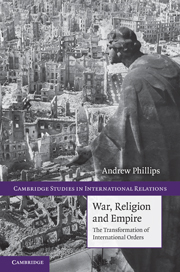Book contents
Introduction
Published online by Cambridge University Press: 10 January 2011
Summary
International orders do not last forever. Throughout history, rulers have struggled to cultivate amity and contain enmity between different political communities. From ancient Rome down to the Sino-centric order that prevailed in East Asia as recently as the nineteenth century, the impulse for order was most often realised via the institution of empire. The rulers of the Greek city-states, their Renaissance counterparts and the feuding kings of China's Period of Warring States alternatively secured order within the framework of sovereign state systems. The papal–imperial diarchy that prevailed in Christendom from the eleventh century to the early sixteenth century provides yet a third form of international order, which was neither imperial nor sovereign but rather heteronomous in its ordering principles.
Their great differences notwithstanding, two features unite the orders mentioned above. First, in each instance, international order was secured through the mobilisation of both authoritative and coercive forms of power. Both practices of communicative action and practices of organised violence have worked in uneasy combination to cultivate co-operation between polities, while simultaneously corralling conflicts between them within manageable bounds. Secondly, each of the aforementioned orders eventually proved finite. Rome's fall, Christendom's collapse and the Sinosphere's liquidation all testify to international orders' impermanence. Equally, the sorry fate of orders past should remind us of the fragility of the present world order, and caution against the conviction that history has definitively ended with the emergence of a global system of sovereign states.
- Type
- Chapter
- Information
- War, Religion and EmpireThe Transformation of International Orders, pp. 1 - 12Publisher: Cambridge University PressPrint publication year: 2010
- 5
- Cited by



